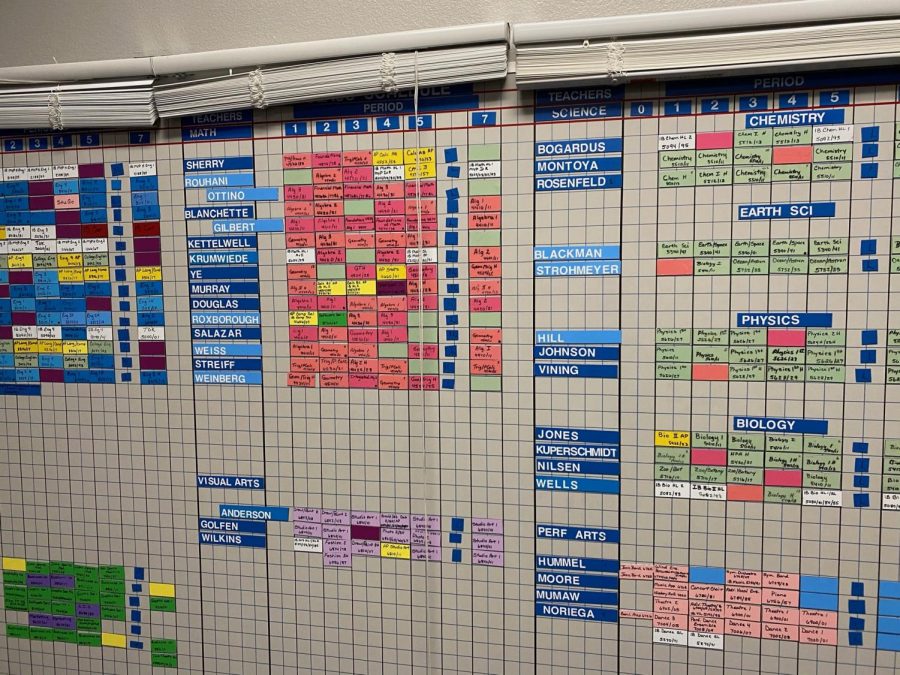A course toward the future
Course selection process ‘different’ this year, DM guidance counselors say
MASTERING THE MASTER SCHEDULE: Mr. Andrews used to utilize this board to plan the master schedule. “I usually don’t start from scratch,” Mr. Andrews said. “I usually take the template from last year and move things around.” This year, however, Mr. Andrews will be planning the schedule electronically.
March 23, 2021
The future.
It’s a concept that invokes stress, fear and optimism, among other assorted emotions.
And DM’s yearly course selection process makes these emotions even stronger.
But this year, an extra dose of stress was added because the process had to be changed to conform with 2021’s unique circumstances.
“I think the changes were good changes,” said Guidance Counselor Mrs. Jones. These included heightened parental involvement, shared information via PowerPoints, the removal of one-on-one student meetings with counselors, and student self-input of their course selections.
The PowerPoints were one of the biggest successes. “Parents were also sent those PowerPoints,” Mrs. Jones said, “so parents had access to be able to go to help their students.” She added that parental involvement was one of the main benefits of this year’s course selection process.
This is similar to the method that colleges typically use for course selection.
“I’m excited that we’re preparing students,” Mrs. Jones said, “so that when you get to college, it’s not a foreign thing.”
But the benefits of student-counselor meetings mean that these meetings will likely return in 2022.
“That personal part about it—that one on one—is what we’re missing,” Mrs. Jones said.
Mrs. Jones says many students would benefit from having conversations with counselors about unfeasible course selections, especially because counselors often must replace these selections with more feasible alternatives.
“I would much rather have that conversation one-on-one,” Mrs. Jones said. “I’ll send an email a lot of times, but students don’t always check email.” Therefore, Mrs. Jones recommends that all students check their email ahead of the March 31 course selection deadline.
Although Mrs. Jones does like the PowerPoints and having students input their own courses, she “also hope[s] we can get back to where we call students in individually.”
Mr. Andrews, the head of DM’s Guidance Department, agrees. “One-on-one meetings, classroom interactions—we definitely need to have those back,” he said.
That way, students can make better-informed decisions before their selections are locked.
“March 31—that’s the deadline,” Mr. Andrews said.
“That used to be March 1,” Mr. Andrews said. “But I said, ‘Let’s push that out a little bit later,’” thereby giving students more time to modify their selections.
Most course selections cannot be changed anytime after the deadline, but there are a few exceptions.
“If you’re signed up for geometry in your sophomore year, but you go and take geometry in the summer,” Mr. Andrews said, “we’ll move you up to Algebra II.” DM is also willing to accommodate course changes because of certain errors, but most choices are set in stone.
“One of my biggest jobs here is building the master schedule,” Mr. Andrews said, and each post-deadline course shift requires a shift in the master schedule, even if the shift is minor.
But amid all these changes, colleges have maintained their expectations.
The main exception is testing, which many colleges have made optional.
Mrs. Dorsch, the head of DM’s College and Career Center, says she believes that this change will be temporary. “I still think that colleges want to see these test scores, if they can.” However, Mrs. Dorsch added that this is a controversial question without an apparent answer.
But no matter what might happen with testing, students’ transcripts will always be a major factor in the college admissions process.
Different colleges have different standards. “State universities, at least in-state, are pretty basic: Unweighted core GPA,” Mrs. Dorsch said. Selective universities are more complicated because they have a wider search radius—but GPA is still important.
Therefore, Mrs. Dorsch advises certain students to retake classes in summer school. “If you get a D or an F,” she said, “or maybe even a C, if you’re not a C student, fix those things while you still have time—get those summer school classes.”
“Summer school is a great thing; that’s where you fix stuff,” Mrs. Dorsch added.
And when it comes time to start looking into different colleges and their expectations, Mrs. Dorsch recommends that students look through each school’s common data set, which provides general information about colleges.
But enjoying high school is important, too. “I have always been frustrated by the early release thing the seniors love to do,” Mrs. Dorsch said. “Take a fun class—you only get high school once.”
And because students only have high school once, they need to have an intuitive course selection process that allows them to plan for their future.
“Personally, I didn’t run into any problems this year,” said sophomore Alexander Chterev.
However, Chterev says he would like to have seen more publicity about meetings related to course selection. “I feel like there were meetings about” course selection, Chterev said, “but I didn’t feel like many people knew about them.
“It was just like, if you happened to hear it from some, or if you happened to look at [DMTV] on that day, you would have seen it. But if not, you would not have known.”
Freshman Kathryn Nieckarz also says this year’s process was straightforward, but she hopes to see some slight changes. “I think more communications with guidance counselors would be nice,” Nieckarz said.
Nieckarz was able to communicate with her counselor to resolve an issue, but many other students did not meet or communicate with their counselors.
“I had a robotics lesson problem,” Nieckarz said, “but my guidance counselor fixed it for me.”
Without any similar problems, Nieckarz would not have communicated with her counselor.
DM’s guidance department is also reflecting on this year’s experience and anticipating next year—and they have a rough idea of how 2022’s course selection process will look like.
“I see kind of a hybrid of what we did this year” and what we did last year, Mrs. Jones said. “I’m glad that we did it the way that we did it, because I think we grew and learned.”



